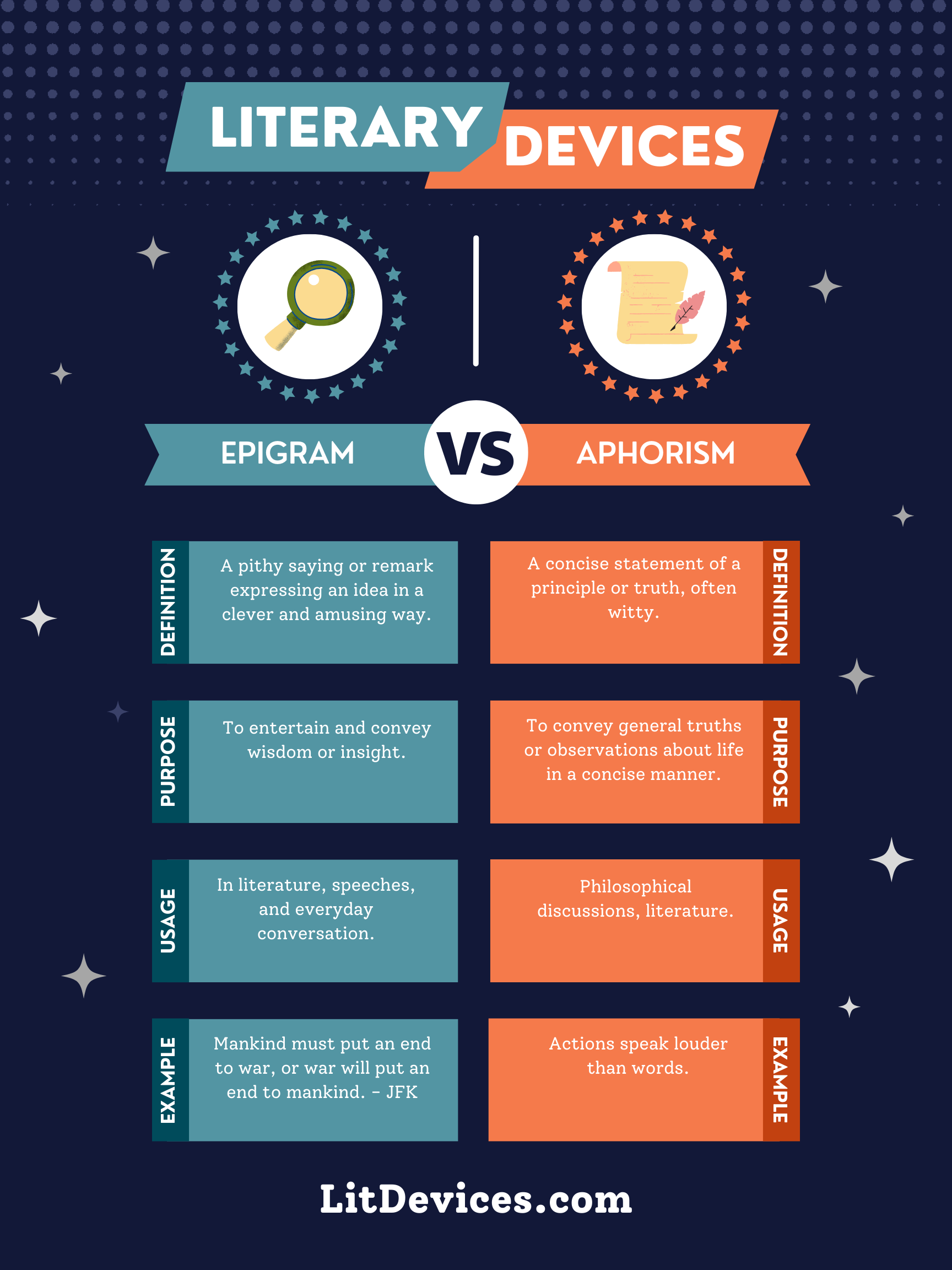Epigram is a brief, witty, and often paradoxical statement; Aphorism is a concise statement of a principle or truth, often witty.
Both epigrams and aphorisms pack a punch, delivering insights, humor, or both in just a few words. They’re the salt and pepper of literary expression, seasoning texts with wit and wisdom. Let’s explore these pithy powerhouses and see what makes them tick. 😄📚
Epigram
Originating from Greek poetry, an epigram is short but loaded with meaning and often humor. It aims to surprise or entertain, sometimes with a twist or a punchline. Oscar Wilde was a master of the epigram, using it to skewer societal norms with lines like, “I can resist everything except temptation.”
Aphorism
Aphorisms offer wisdom or insight in a concise and memorable way. They’re philosophical and reflective, often becoming part of common parlance. Benjamin Franklin’s “An ounce of prevention is worth a pound of cure” exemplifies an aphorism’s practical, timeless wisdom.
Summary
| Literary Device | Definition | Purpose | Usage | Relevant Examples |
|---|---|---|---|---|
| Epigram | A brief, witty, and often paradoxical statement. | To entertain or satirize with brevity and wit. | Poetry, prose, speeches. | Oscar Wilde: “I can resist everything except temptation.” |
| Aphorism | A concise statement of a principle or truth. | To convey wisdom or truth in a memorable way. | Philosophical texts, everyday language. | Benjamin Franklin: “An ounce of prevention is worth a pound of cure.” |
Writing Tips
Whether crafting an epigram or an aphorism, brevity and clarity are your allies. Here are some pointers to get you started:
- Focus on Clarity: Your message should be clear in just one reading.
- Wit is Key for Epigrams: Aim for a humorous, surprising twist.
- Depth for Aphorisms: Your statement should reflect a universal truth or insightful observation.
- Revise, Revise, Revise: The best epigrams and aphorisms often come from refining your initial thought.
FAQs
Can an epigram be an aphorism?
Yes, when an epigram conveys a general truth or principle in a witty manner, it can also be considered an aphorism.
How do you distinguish between an epigram and an aphorism?
Focus on the intent: epigrams often aim to entertain or satirize, while aphorisms seek to impart wisdom or truth.
Exercise
Read the following statement and decide if it’s an epigram or an aphorism:
“Life is short, but it’s wide.”
Answer: This statement is an aphorism, offering insight into life’s breadth of experiences in a concise manner.
Other Interesting Literary Device Comparisons
- Metaphor vs Simile: Both compare two unlike things, but metaphors do so directly, while similes use “like” or “as.”
- Irony vs Sarcasm: Both involve saying the opposite of what is meant, but irony is subtler and situational, while sarcasm is direct and often mocking.
- Allegory vs Symbolism: Both convey deeper meanings, but allegory uses a narrative or characters consistently representing something else, while symbolism uses specific symbols to represent ideas or concepts.
Exploring the nuances of these devices can deepen your appreciation of literary craftsmanship and enhance your own writing. 📘✍️

